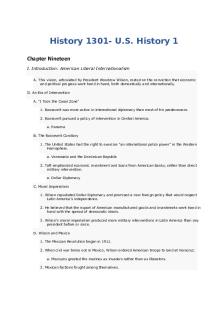Chapter 5-7, Give Me Liberty by Eric Foner. PDF

| Title | Chapter 5-7, Give Me Liberty by Eric Foner. |
|---|---|
| Author | Hannah Webb |
| Course | history |
| Institution | Marshall B. Ketchum University |
| Pages | 1 |
| File Size | 98.3 KB |
| File Type | |
| Total Downloads | 29 |
| Total Views | 163 |
Summary
Short summary of early chapter 5 so I can get premium days. Covers about three whole pages....
Description
Give Me Liberty Chapter 5, The American Revolution Book Notes
The Crisis Begins ● ●
In 1760 George lll took over the British throne. The Seven Years’ War left Britain in mounds of debt and no ability to control their newly obtained land from overseas. ○ Britain sought out ways to make the colonies share the cost of the empire. ■ Colonizers saw that continuing in the British empire was a threat to freedom. This set the road to independence.
Consolidating the Empire ●
●
●
●
●
Before 1763, the Parliament issued Acts to forbid colonies from doing things. ○ Forbade the use of paper money. ○ The Wool Act of 1699, Hat Act of 1732, & Iron Act of 1750 forbade the manufacturing of these respective things. ○ The Molasses Act of 1733 sought to stop certain trade. ○ Navigation Acts sought to make the colonies rely on the mother-country. ■ The colonists mainly ignored these Acts. Great Britain and the colonies were allies during the French Indian War. ○ They contributed soldiers and economic resources. ○ The British reverted this status in the mid-1760’s and went back to viewing the colonies as subordinates with one job: enrich the mother country, and: ■ Make British rule more efficient and systematic. ■ Raise funds to help pay for war. ■ Finance the British empire. British leaders supported new laws in America, this enraged the colonists. ○ Britons felt Americans should be grateful for fighting in the Seven Years’ War. ○ Help pay back war expenses (150 million plus euros=tens of trillion dollars today) ○ Pay for continued British support and protection ○ Stop cheating the Treasury by violating the Navigation Acts. Virtual Representation: The idea that the colonies, although having no representatives in Parliament, were ‘virtually represented” by all members of Parliament. ○ Philosophy that each member of Parliament represented all of the empire, not just their district. ○ America insisted they were unrepresented, and therefore, could not be taxed. Colonists were outraged b...
Similar Free PDFs

Chapter 16 Give Me Liberty
- 8 Pages

Chapter 3 Give me Liberty
- 9 Pages

Chapter 8 : Give me liberty
- 7 Pages
Popular Institutions
- Tinajero National High School - Annex
- Politeknik Caltex Riau
- Yokohama City University
- SGT University
- University of Al-Qadisiyah
- Divine Word College of Vigan
- Techniek College Rotterdam
- Universidade de Santiago
- Universiti Teknologi MARA Cawangan Johor Kampus Pasir Gudang
- Poltekkes Kemenkes Yogyakarta
- Baguio City National High School
- Colegio san marcos
- preparatoria uno
- Centro de Bachillerato Tecnológico Industrial y de Servicios No. 107
- Dalian Maritime University
- Quang Trung Secondary School
- Colegio Tecnológico en Informática
- Corporación Regional de Educación Superior
- Grupo CEDVA
- Dar Al Uloom University
- Centro de Estudios Preuniversitarios de la Universidad Nacional de Ingeniería
- 上智大学
- Aakash International School, Nuna Majara
- San Felipe Neri Catholic School
- Kang Chiao International School - New Taipei City
- Misamis Occidental National High School
- Institución Educativa Escuela Normal Juan Ladrilleros
- Kolehiyo ng Pantukan
- Batanes State College
- Instituto Continental
- Sekolah Menengah Kejuruan Kesehatan Kaltara (Tarakan)
- Colegio de La Inmaculada Concepcion - Cebu












